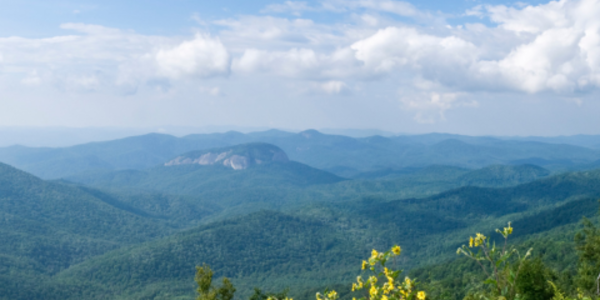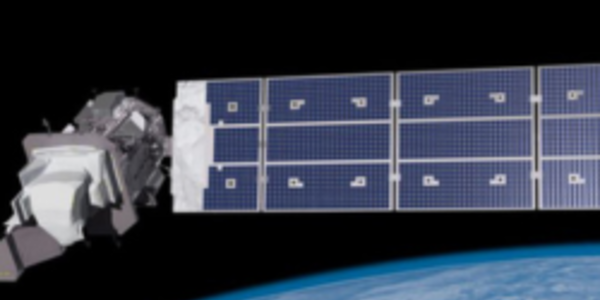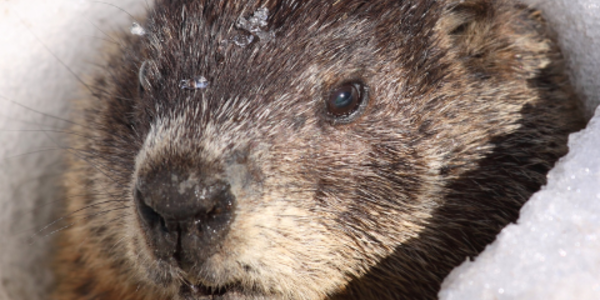
NCEI scientists will be attending the 2019 American Geophysical Union (AGU) Fall Meeting, which returns to San Francisco for the first time since 2016. The meeting will be held at the newly renovated Moscone Center, December 9-13, 2019. The 2019 meeting closes out AGU’s Centennial celebration.
The AGU Fall Meeting is the largest international Earth and space science meeting in the world, and more than 25,000 leaders from academia, government, and the private sector from more than 100 countries are expected to attend. Throughout the week, they will attend oral and poster presentations as well as have access to an exhibit hall with hundreds of exhibitors showcasing new and relevant research tools and services.
NCEI Town Hall
One of the opportunities for AGU Fall Meeting attendees is the NCEI Town Hall: Meeting Your Environmental Data Needs, Tuesday, December 10, from 12:30–1:30 PM PST in Moscone West – 3003, L3. Come to NCEI’s Town Hall to engage directly with our scientists and leadership, hear what’s new, and share thoughts on future products. And, most importantly, attendees will have the chance to have their data questions answered by NCEI’s experts.
Finding NCEI at AGU
NCEI scientists and affiliates have contributed to 60 sessions, forums, presentations, and posters. In addition to attending the Town Hall, follow #AGU19 and #NCEIatAGU on social media for more updates on the AGU Fall Meeting and our contributions to it. You can also stop by the NOAA booth (#921) where NCEI scientists will be sharing their work and answering questions.
Check out our AGU talks, posters, and presentations to learn more about NCEI’s archives of environmental satellite data and the research we support.
NCEI Talks, Posters, and Presentations (All times are PST)
Monday, December 9
-
Make Your Communications Staff Your Science Advocates, 8:00 AM–12:20 PM, Moscone South – Poster Hall
-
The Structure and Dynamics of the Middle Corona Observed by the GOES Solar Ultraviolet Imager, 8:00 AM–12:20 PM, Moscone South – Poster Hall
-
Explaining Extreme Events in a Changing Climate (Invited), 8:15–8:30 AM, Moscone West – 2005, L2
-
Moving Environmental Data Management from the Ground to the Cloud at NOAA's NESDIS and NCEI, 9:24–9:36 AM, Moscone West – 2018, L2
-
Can seafloor voltage cables be used to study large scale transport? An investigation in the Pacific Ocean, 11:05–11:20 AM, Moscone West – 2000, L2
-
Detecting Trends in Tropical Cyclones (Invited), 11:20–11:50 AM, Moscone West – 3012, L3
-
Reading gas flare histories with VIIRS nightfire temporal profiles: preliminary results, 1:40–6:00 PM, Moscone South – Poster Hall
-
NOAA Ocean Exploration and Research Mapping Contributions to Seabed 2030, 1:40–6:00 PM, Moscone South – Poster Hall
-
From Mud to Sun: Evolving NCEI’s Archive of and Access to NOAA’s Environmental Data, 4:00–6:00 PM, Moscone South – eLightning Theater III
-
Managing Video Data: Real-time Annotation and Self-Service Search, Discovery, and Access Tools, 4:00–6:00 PM, Moscone South – eLightning Theater III
-
NCEI Story Maps: Bringing Data to Life, 4:00–6:00 PM, Moscone South – eLightning Theater I
Tuesday, December 10
-
Data Collection Requirements for the World Magnetic Model, 8:00 AM–12:20 PM, Moscone South – Poster Hall
-
Environmental, Socioeconomic, and Climatic Changes in Northern Eurasia II Posters, 8:00 AM–12:20 PM, Moscone South – Poster Hall
-
Low-latency modeling of near-Earth-space magnetic fields for resource exploration, 8:00 AM–12:20 PM, Moscone South – Poster Hall
-
NOAA’s National Centers for Environmental Information (NCEI) Data Management Best Practices to benefit Science and Society, 8:00 AM–12:20 PM, Moscone South – Poster Hall
-
Northern Eurasia Future Initiative (NEFI), Update, 8:00 AM–12:20 PM, Moscone South – Poster Hall
-
Recent and future climate and streamflow changes in the Western Dvina River Basin, 8:00 AM–12:20 PM, Moscone South – Poster Hall
-
Scientific Data Stewardship for NOAA Oceanographic Satellite Observational Products, 8:00 AM–12:20 PM, Moscone South – Poster Hall
-
Data reusability and its role in the democratization of marine data, 8:30–8:40 AM, Moscone West – 2018, L2
-
NCEI Town Hall: NOAA's National Centers for Environmental Information (NCEI) Town Hall: Meeting Your Environmental Data Needs, 12:30–1:30 PM, Moscone West – 3003, L3
-
Enhancing Data Reusability: Experiences from NOAA’s NCEI, 1:40–6:00 PM, Moscone South – Poster Hall
-
Simultaneous Observations of Pc1-2 Electromagnetic Ion Cyclotron and Pc4-5 Ultra Low Frequency Waves by the GOES-16 Spacecraft, 1:40–6:00 PM, Moscone South – Poster Hall
-
Realizing the Full Value of NOAA’s Data through Data Stewardship, 2:30–2:45 PM, Moscone North – NOAA Booth #921
-
Environmental, Socioeconomic, and Climatic Changes in Northern Eurasia I, 4:00–6:00 PM, Moscone West – 2010, L2
-
The future effects of AI, Cloud and Data Science techniques on data stewardship at the WDS for Geophysics, 5:00–5:15 PM, Moscone West – 2018, L2
Wednesday, December 11
-
Interdisciplinary Tsunami Science I, 8:00–10:00 AM, Moscone West – 2016, L2
-
Estimating the Relative Uncertainties of the GOES-NOP Magnetometer Measurements and the TS04 Magnetic Field Model from 2013-2018, 8:00 AM–12:20 PM, Moscone South – Poster Hall
-
Interdisciplinary Tsunami Science II, 10:20 AM-12:20 PM, Moscone West – 2016, L2
-
Spatial Model-Data Comparison of Mid-Holocene Temperatures, 1:40–6:00 PM, Moscone South – Poster Hall
-
Improving Climate Data Visualization and Information Dissemination on the U.S. Drought Portal through User Experience (UX) Design, 1:40–6:00 PM, Moscone South – Poster Hall
-
Interdisciplinary Tsunami Science III, 1:40–3:40 PM, Moscone West – 2016, L2
-
Interdisciplinary Tsunami Science IV, 4:00–6:00 PM, Moscone West – 2016, L2
-
CrowdMag for Mapping the Urban Magnetic Environment, 4:15–4:30, Moscone West – 2012, L2
Thursday, December 12
-
Interdisciplinary Tsunami Science V, 8:00 –10:00 AM, Moscone West – 2016, L2
-
Metop-C Space Environment Monitor (SEM-2), 8:00 AM–12:20 PM, Moscone South – Poster Hall
-
An Analysis of Heavy Multi-day Precipitation Events In CMIP6 Model Simulations in Support of the Fifth National Climate Assessment, 10:20 AM–12:20 PM, Moscone South – eLightning Theater III
-
Assessment of Hydroclimatic Variability and Change in CMIP6 Climate Models I eLightning, 10:20 AM–12:20 PM, Moscone South – eLightning Theater III
-
Centennial Early-Career Scientist Forum, 12:30–1:30 PM, Moscone West – 3005, L3
-
Deep Learning Semantic Segmentation for Climate Change Precipitation Analysis, 1:40–6:00 PM, Moscone South – Poster Hall
-
Historical Tsunami Effects near the New Hebrides Trench, 1:40–6:00 PM, Moscone South – Poster Hall
-
Interdisciplinary Tsunami Science Posters VI, 1:40–6:00 PM, Moscone South – Poster Hall
-
NCEI’s Natural Hazards Image Database: Natural Hazard Image Rescue, Discovery, and Accessibility, 1:40–6:00 PM, Moscone South – Poster Hall
-
Past, present, and future: Interface for the NCEI/WDS Global Historical Tsunami Database, 1:40–6:00 PM, Moscone South – Poster Hall
-
Interdisciplinary Tsunami Science Posters VII, 1:40–6:00 PM, Moscone South – Poster Hall
-
Interdisciplinary Tsunami Science Posters VIII, 1:40–6:00 PM, Moscone South – Poster Hall
-
Improved estimates of ocean heat content for understanding the Earth's Energy Imbalance, 1:55–2:10 PM, Moscone West – 2008, L2
-
How Much Can We Learn About Rain Microphysics from Polarimetric Radar Observations? An Investigation of Information Content and Parameter Estimation Using the Bayesian Observationally-constrained Statistical-physical Scheme (BOSS), 2:55–3:10 PM, Moscone West – 3010, L3
-
Taking NESDIS to the Cloud, 3:45–4:00 PM, Moscone North – NOAA Booth #921
-
Integrating long term satellite data and in situ observations to study snow-albedo-temperature feedback over the Tibetan Plateau, 5:00–5:15 PM, Moscone West – 2005, L2
Friday, December 13
-
Improving surface temperature data quality by leveraging daily satellite observations and machine learning techniques (Invited), 8:00 AM–12:20 PM, Moscone South – Poster Hall
-
A Common Platform for Oceanic Biogeochemical Carbon Data Assembly, QC, Access and Archival, 8:00 AM–12:20 PM, Moscone South – Poster Hall
-
A comparison of bulk- and bin-microphysical schemes for warm rain processes and their polarimetric radar fingerprints : sensitivity analysis and implications for microphysical parameterizations, 8:00 AM–12:20 PM, Moscone South – Poster Hall
-
Cross-border DEM workshop collaboration for coastal flood hazard mitigation in the Salish Sea, 8:00 AM–12:20 PM, Moscone South – Poster Hall
-
The Response of Reference Evapotranspiration to Climate Change in Xinjiang, China: Historical Changes, Driving Forces, and Future Projections, 8:00 AM–12:20 PM, Moscone South – Poster Hall
-
Uncertain Seas: Probabilistic Modeling of Future Coastal Flood Zones, 8:00 AM–12:20 PM, Moscone South – Poster Hall
-
Uncertainty estimates for sea surface temperature and land surface air temperature in NOAAGlobalTemp version 5, 8:00 AM–12:20 PM, Moscone South – Poster Hall
-
Using CrowdMag to Catalog Magnetic Anomalies from Urban Infrastructure and Geological Features, 8:00 AM–12:20 PM, Moscone South – Poster Hall
-
Release of NOAA Global Surface Temperature (NOAAGlobalTemp) Dataset Version 5, 8:00 AM–12:20 PM, Moscone South – Poster Hall
-
Extreme Precipitation Trends and Weather System Influences (Invited), 10:20–10:35 AM, Moscone West – 3022, L3
-
Extracting Surface Absorbed Solar Radiation in Near Real-time from GOES-R, 11:20–11:32 AM, Moscone West – 2007, L2
-
Developing an Interactive Global Drought Information Dashboard Using Remotely Sensed Near-Real Time Monitoring, 1:40–6:00 PM, Moscone South – Poster Hall
-
Observed Climatological Relationships between Precipitable Water and Extreme Precipitation in the Contiguous United States, 3:05–3:20 PM, Moscone West – 2005, L2
-
The Natural Hurricane Barrier Along the U.S. Southeast Coast, Past and Future, 4:53–5:09 PM, Moscone West – 2005, L2



